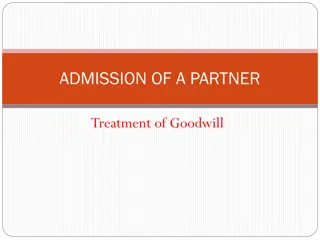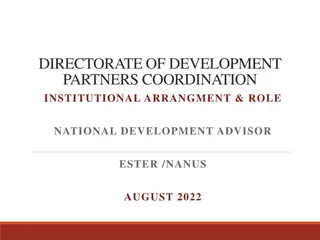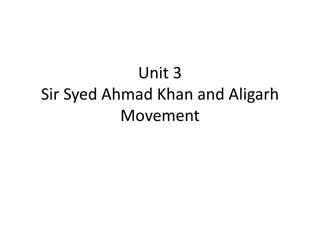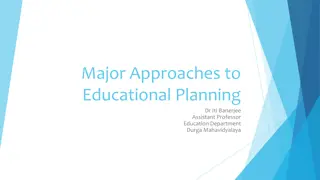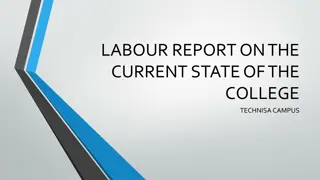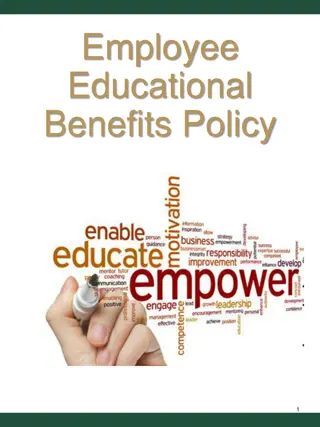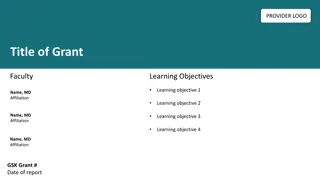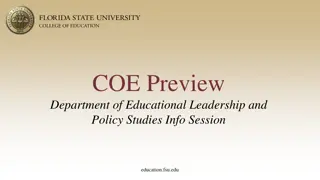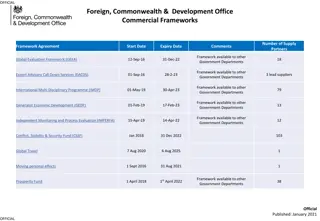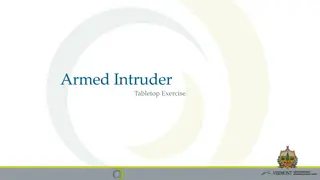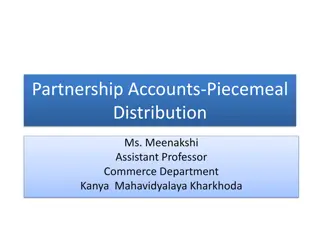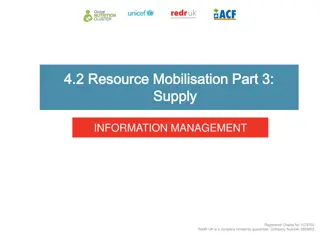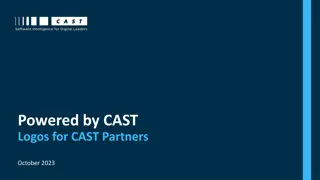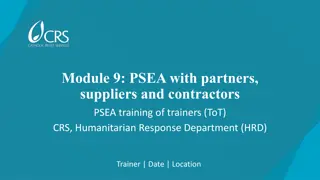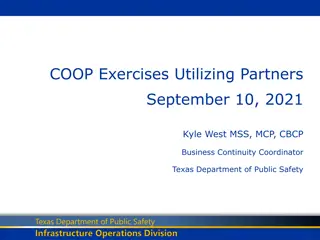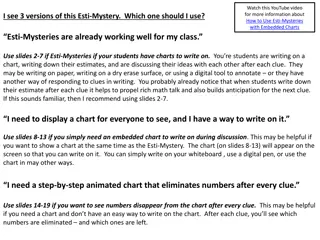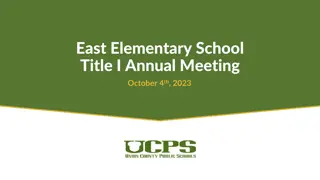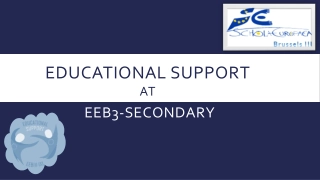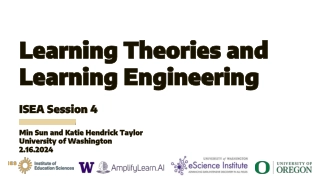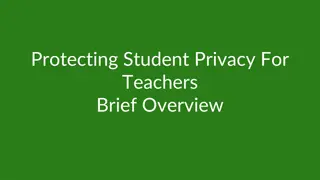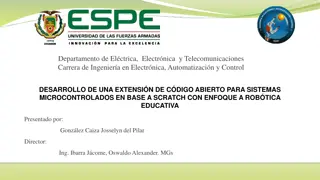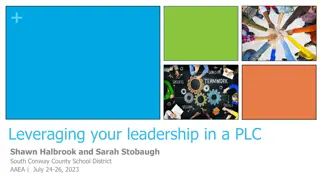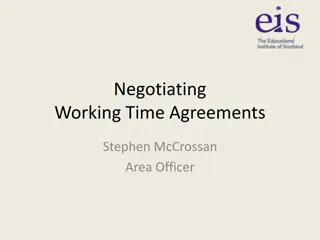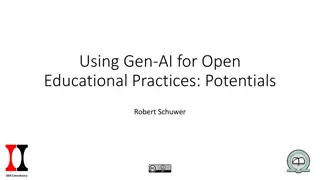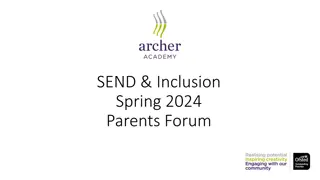Engaging Educational Partners
Explore the importance of engaging educational partners in the development of local education plans, focusing on the California Department of Education's upcoming webinar series and available template files for the Local Control and Accountability Plan (LCAP). Learn about requirements, considerations, and benefits of involving educational partners for meaningful planning and improved student outcomes.
Download Presentation

Please find below an Image/Link to download the presentation.
The content on the website is provided AS IS for your information and personal use only. It may not be sold, licensed, or shared on other websites without obtaining consent from the author. Download presentation by click this link. If you encounter any issues during the download, it is possible that the publisher has removed the file from their server.
E N D
Presentation Transcript
Engaging Educational Partners November 30, 2023 California Department of Education (CDE)
Webinar Series 3 pm, Thursday, November 30: Engaging Educational Partners 2 pm, Tuesday, December 5: Goal Analysis 3 pm, Thursday, December 7: Goals and Actions 2 pm, Tuesday, December 12: Required Goals for Equity Multiplier Schools 3 pm, Thursday, December 14: Increased or Improved Services, Part I 2 pm, Tuesday, December 19: Increased or Improved Services, Part II 2 pm, Tuesday, January 9: 2024 Local Indicators To register, please visit the Tuesdays @ 2 Webinar Series web page: https://www.cde.ca.gov/fg/aa/lc/tuesdaysat2.asp 2
Template Files 2023 24 Local Control and Accountability Plan (LCAP) Annual Update Template: https://www.cde.ca.gov/re/lc/documents/annualupdatetemplate2023.docx 2024 25 LCAP Template: https://www.cde.ca.gov/re/lc/documents/adoptedlcaptemplate2024.docx 2024 25 LCAP Action Tables Template: https://www.cde.ca.gov/re/lc/documents/lcapactiontables2024.xlsx The Budget Overview for Parents Template: https://www.cde.ca.gov/re/lc/documents/budgetoverviewparent.xlsx 3
Purpose of Todays Webinar To discuss: Why engagement of educational partners is critical to the development of a comprehensive plan that addresses local needs; Requirements for engaging educational partners in the development of the LCAP; Requirements for completing the Engaging Educational Partners section of the LCAP; and Considerations for meaningful engagement of educational partners. 4
Intended Audience The intended audience for this presentation is anyone involved in the educational partners engagement process as part of the development of the 2024 25 LCAP or in completing the Engaging Educational Partners section of the LCAP. 5
Why is educational partner engagement essential? 6
Engaging educational partners meaningfully in comprehensive planning is necessary in order to support improved student outcomes. 7
Foundational Principles of LCFF Local education agency (LEA)-level improvement that is based on multiple measures of success Equity Additional funding to address specific identified needs of students who are low income, English learners, and/or foster youth (i.e., unduplicated students) Requirement to Increase or Improve Services in proportion to the increase in funding Subsidiarity Social and political issues are best dealt with at the local level 8
Framing the LCAP The LCAP development process serves three distinct, but related functions: MEANINGFUL ENGAGEMENT OF EDUCATIONAL PARTNERS COMPREHENSIVE PLANNING ACCOUNTABILITY AND COMPLIANCE 9
Meaningful Engagement Significant and purposeful engagement of parents, students, educators, and other educational partners, including those representing the student groups identified by LCFF, is critical to the development of the LCAP and the budget process. Local partners possess important information, perspectives and insights about student needs and how to address such needs. The LCAP development process should result in an LCAP that reflects decisions made through meaningful engagement of educational partners. Engagement of educational partners is an ongoing, annual process. 10
Benefits of Engaging Partners Engaging educational partners is not only a requirement; research has identified it as a key practice of effective LEAs. There are many benefits to partnering with local community members, such as: Better understanding of current needs and possible solutions More informed decision-making Greater trust Stronger and longer lasting partnerships Greater likelihood of improved student outcomes given access to broader input and information 11
Reminder of Written Notification Requirements LEAs must ensure that all written notifications related to the LCAP are provided consistent with California Education Code (EC) Section 48985, which requires that if 15 percent or more of the students enrolled in a public school speak a primary language other than English all notices, reports, statements, or records sent to the parent or guardian of those students must be written in the primary language. 12
Who Must Be Consulted in the Development of the LCAP? 13
Consultation Required: COEs and Districts Prior to adopting an LCAP, districts and county offices of education (COEs) must consult with the following educational partners [Education Code (EC) Section 52060(g) and EC 52066(g)]: Teachers Principals Administrators Other school personnel Local bargaining units Parents* Students [*Note: The EC and Regulations stipulate that LEAs must engage parents as part of the development of the LCAP. When referring to parents, statute and regulation mean the educational rights holders for students.] 14
Consultation Required: Charters Prior to adopting an LCAP, charter schools must consult with the following educational partners [EC Section 47606.5 (d)]: Teachers Principals Administrators Other school personnel Parents* Students [*Note: The EC and Regulations stipulate that LEAs must engage parents as part of the development of the LCAP. When referring to parents, statute and regulation mean the educational rights holders for students.] 15
Required Consultation An LEA receiving Equity Multiplier funds must also consult with educational partners at schools generating Equity Multiplier funds in the development of the LCAP, specifically, in the development of the required focus goal for each applicable school. 16
Statute identifies the floor for engagement, not the ceiling. Are there additional locally determined opportunities that can support comprehensive planning? 17
Additional Partner Considerations LEAs are encouraged to consider consulting with additional partners in the development of the LCAP. These may include: Families School Site Council (SSC) Parent Advisory Committee English Learner Advisory Committee Special Education Local Plan Area (SELPA) Administrators Community Advisory Committee (CAC) English Learner (EL) Coordinator(s)/Administrators Foster Youth/Homeless Coordinators/Administrators Federal Program Administrators Other locally determined organizations or groups 18
What Additional Requirements Do LEAs Have to Fulfill Before Adopting the LCAP? 19
Additional COE and District Requirements (1 of 2) Once the LCAP has been developed, COEs and districts must do the following prior to adopting the LCAP: 1. Present the developed LCAP to the parent advisory and English learner parent advisory committee (if applicable) and respond in writing to comments received. The members of the parent advisory committee and English learner parent advisory committee must be clearly identified to the public. Parent Advisory Committee and English Learner Parent Advisory Committee meetings must adhere to the requirements of the Greene Act. 2. Notify members of the public of the opportunity to submit written comments regarding the specific actions and expenditures proposed to be included in the LCAP. 3. Review school plans submitted pursuant to EC Section 64001. 20
Additional COE and District Requirements (2 of 2) 4. Consult with its SELPA administrator(s) to determine that specific actions for individuals with exceptional needs are included in the LCAP. 5. Present a report on the annual update to the LCAP and the LCFF budget overview for parents on or before February 28 of each year. The report must include both of the following: A. All available midyear outcome data related to metrics identified in the current year s LCAP. B. All available midyear expenditure and implementation data on all actions identified in the current year s LCAP. 6. Hold at least one public hearing to solicit recommendations and comments from members of the public regarding the specific actions and expenditures proposed to be included in the LCAP. 21
Students on Advisory Committees Beginning July 1, 2024, a parent advisory committee of a school district or COE serving middle school or high school students must include at least two pupils as full members of the parent advisory committee unless it already has an established student advisory committee. If the governing board of the district or COE establishes a student advisory committee, it is required take into consideration the diversity of the school district or COEs students. Particular effort should be made to reach out to at-risk or disadvantaged pupils to serve as members of a parent advisory committee or student advisory committee. 22
Greene Act Requirements The student committee, the parent advisory committee and the English learner parent advisory committee are all required to follow the Greene Act. The Greene Act is described in EC Section 35147. Greene Act requirements include: The meeting being open to the public; Providing any member of the public the opportunity to address the committee during the meeting publicly noticing the meeting at least 72 hours before the time set for the meeting, including specifying the date, time, and location of the meeting Noticing an agenda describing each item of business to be discussed or acted upon. 23
Additional Requirements for Charters Once the LCAP has been developed, charters must do the following prior to adopting the LCAP: 1. Present a report on the annual update to the LCAP and the LCFF budget overview for parents on or before February 28 of each year. The report shall include both of the following: A.All available midyear outcome data related to metrics identified in the current year s LCAP. B.All available midyear expenditure and implementation data on all actions identified in the current year s LCAP. 2. Hold a public hearing to solicit recommendations [EC Section 47606.5(f)] A. This public hearing may be part of the same public hearing at which the charter school's LCAP is adopted. 24
Additional Requirements for Charters Using LCAP as the SPSA A charter school using the LCAP as their School Plan for Student Achievement (SPSA) for federal planning purposes, must adhere to all requirements identified in slides 20 through 23. 25
What are the LCAP Adoption, Submission, Approval and Posting Requirements? 26
LCAP Adoption for COEs and Districts The governing board of a school district or a COE must adopt the LCAP at a public meeting on or before July 1 of each year. This meeting must be held after, but not on the same day as, the public hearing discussed in slide 24. This meeting must be the same meeting at which the governing board of the school district or COE adopts its budget. The school district or COE must also report its California School Dashboard (Dashboard) local indicators at this meeting. 27
LCAP Adoption for Charters The governing body of a charter school must hold a public hearing to adopt the LCAP on or before July 1 of each year. At this meeting, the governing body of the charter school must update the goals and annual actions to achieve those goals identified in the charter petition. The charter school must also report its Dashboard local indicators at this meeting. 28
LCAP Submission Not later than five days after adoption of the LCAP or annual update to the LCAP, the: COE must submit its adopted LCAP to the CDE for review and approval. District must submit its adopted LCAP to their COE for review and approval. On or before July 1st, a charter school must submit its adopted LCAP to its chartering authority and the county superintendent of schools, or only to the county superintendent of schools if the county board of education is the chartering authority. 29
LCAP Posting Requirements: Districts and COEs School districts must: Post any approved LCAP, including any updates, revisions, or addenda on the homepage of the district website. Post all LCAPs submitted by charter schools that were authorized by the district, or links to those plans, on the homepage of the district website. COEs must: Post any approved LCAP, including any updates, revisions, or addenda on the homepage of the COEs website. Post all LCAPs submitted by school districts and charter schools, or links to those plans, on the website of the COE. Provide the CDE with links to all LCAPs submitted to the COE by school districts and charter schools, and the COE LCAP. 30
LCAP Posting Requirements: Charters Charter schools must: Post on its home page anyLCAP adopted by the governing body of the charter school, and any updates, revisions, or addenda to an LCAP approved by the governing body of the charter school. 31
LCAP Revisions: All LEAs The governing board/body of an LEA may adopt revisions to their LCAP during the period the LCAP is in effect only if it follows the process to adopt the LCAP and the revisions are adopted in a public meeting. 32
The Engaging Educational Partners Section 33
A summary of the process used to engage educational partners in the development of the LCAP. Overview of Engaging Educational Partners Section A description of how the adopted LCAP was influenced by the feedback provided by educational partners. 34
Engagement Process: Template (1) Engaging Educational Partners: Prompt 1 A summary of the process used to engage educational partners in the development of the LCAP. School districts and county offices of education must, at a minimum, consult with teachers, principals, administrators, other school personnel, local bargaining units, parents, and students in the development of the LCAP. Charter schools must, at a minimum, consult with teachers, principals, administrators, other school personnel, parents, and students in the development of the LCAP. An LEA receiving Equity Multiplier funds must also consult with educational partners at schools generating Equity Multiplier funds in the development of the LCAP, specifically, in the development of the required focus goal for each applicable school. 35
Engagement Process: Template (2) Educational Partner(s) [Identify applicable partner(s) or group(s) here] [Identify applicable partner(s) or group(s) here] [Identify applicable partner(s) or group(s) here] Process for Engagement [Describe the process for engaging the identified educational partner(s) here] [Describe the process for engaging the identified educational partner(s) here] [Describe the process for engaging the identified educational partner(s) here] 36
Engagement Process: Instructions (1 of 2) Complete the table as follows: Educational Partners Column: Identify the applicable educational partner(s) or group(s) that were engaged in the development of the LCAP. Process for Engagement Column: Describe the engagement process used by the LEA to involve the identified educational partner(s) in the development of the LCAP. At a minimum, the LEA must describe how it met its obligation to consult with all statutorily required educational partners, as applicable to the type of LEA. 37
Engagement Process: Instructions (2 of 2) A sufficient response to this prompt must include general information about the timeline of the process and meetings or other engagement strategies with educational partners. A response may also include information about an LEA s philosophical approach to engaging its educational partners. An LEA receiving Equity Multiplier funds must also include a summary of how it consulted with educational partners at schools generating Equity Multiplier funds in the development of the LCAP, specifically, in the development of the required focus goal for each applicable school. 38
Influence on the Adopted LCAP: Template Engaging Educational Partners: Prompt 2 A description of how the adopted LCAP was influenced by the feedback provided by educational partners. 39
Influence on the Adopted LCAP: Instructions Describe any goals, metrics, actions, or budgeted expenditures in the LCAP that were influenced by or developed in response to the educational partner feedback. A sufficient response to this prompt will provide educational partners and the public with clear, specific information about how the engagement process influenced the development of the LCAP. This may include a description of how the LEA prioritized requests of educational partners within the context of the budgetary resources available or otherwise prioritized areas of focus within the LCAP. An LEA receiving Equity Multiplier funds must include a description of how the consultation with educational partners at schools generating Equity Multiplier funds influenced the development of the adopted LCAP. 40
Influence on Adopted LCAP (1 of 2) For the purposes of this prompt, this may also include, but is not necessarily limited to: Inclusion of a goal or decision to pursue a Focus Goal (as described below) Inclusion of metrics other than the statutorily required metrics Determination of the target outcome on one or more metrics Inclusion of performance by one or more student groups in the Measuring and Reporting Results subsection Inclusion of action(s) or a group of actions Elimination of action(s) or group of actions 41
Influence on Adopted LCAP (2 of 2) (Continued from prior slide) Changes to the level of proposed expenditures for one or more actions Inclusion of action(s) as contributing to increased or improved services for unduplicated students Analysis of effectiveness of the specific actions to achieve the goal Analysis of material differences in expenditures Analysis of changes made to a goal for the ensuing LCAP year based on the annual update process Analysis of challenges or successes in the implementation of actions 42
Reminders 43
Reminders (1) The LCAP template and instructions provide the requirements for addressing each prompt in the LCAP and the technical information for LEAs to complete the template properly. Responses are required to be written in a way that is understandable and accessible to parents and other educational partners. LEAs are strongly encouraged to use language and a level of detail in their adopted LCAPs intended to be meaningful and accessible for the LEA s diverse educational partners and the broader public. 44
Considerations to Promote Meaningful Engagement 45
Planning (1 of 2) Inclusiveness, accessibility and equity Strong relationships (focus on building respectful, collaborative and trusting relationships) The knowledge, skills, and abilities of school staff and families to meaningfully engage with each other in support of improved student outcomes (referred to as dual capacity building) Building and maintaining trusting relationships is a responsibility of both LEAs and their educational partners. Meaningful engagement in the LCAP development process 46
Planning (2 of 2) (continued) Shared responsibility Improved student outcomes Transparency A shared focus on continuous improvement 47
Strategies: Continuous Improvement Monitor the impact of engagement strategies Ask for feedback to improve engagement efforts/outcomes over time Reflect upon prior practices and approaches for engaging educational partners Understand needs and interests of each educational partner group Identify strategies that have worked well and areas for possible improvement Update engagement plans/practices based on requirements, data, information, reflection, needs, resources, etc. Keep educational partners informed of engagement opportunities 48
Strategies: Systems and Structures To the extent practicable, dedicate resources and staff to support engagement of educational partners, including students Dedicate time for collaboration Develop policies and practices to embed partner engagement into the culture of the LEA vs one-time engagement events Establish partnerships with community-based organizations to support student learning/development 49
Strategies: Conditions and Climate Build trust, relationships, shared responsibility, and collaboration Understand the languages and cultures of student groups Communicate early and often using multiple formats/strategies Create and maintain welcoming environments where all educational partners are valued Promote understanding of content to be discussed Provide multiple opportunities for consultation/engagement Clearly reflect how the process for engaging educational partners influenced the development of the LCAP 50


